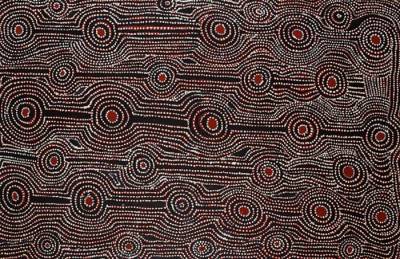1 / 2
1012-06
Acrylic on Linen
Anumara Tjukurpa | 1012-06
Acrylic on Linen
76 x 51cm | 29.92 x 20.08in
ENQUIRE
This painting tells the Creation Time story of the caterpillars ’anumara’. The anumara is a large edible caterpillar with a hook on its tail. It is a story about kinship groups - represented by the North and the South. Hector is in one group - the South - (anumara) and his uncles, nephews, and fathers in the other (North - the other caterpillars - muya muya and ngalyakanti, literally ’hard forehead’). All the caterpillars travelled from places in the north and the south, and all met up in one resting place (ngura). When the minyma (women) and tjitji (children) arrive, the women dance in the fire and give the man the ceremonial stick. This is a beautiful ceremony, which Hector went through, long ago.
This ceremony was not performed for a long time, until more recently, when men from Amata took part. It is important that these ceremonies are kept going.
Read LessAppeared in these exhibitions
550-07 (2007)
Acrylic on Linen
Anumara Tjukurpa | 550-07
Acrylic on Linen
122 x 101.5cm | 48.03 x 39.96in
ENQUIRE
This painting tells the Creation Time story of the caterpillars ’anumara’. The anumara is a large edible caterpillar with a hook on its tail. It is a story about kinship groups - represented by the North and the South. Hector is in one group - the South - (anumara) and his uncles, nephews, and fathers in the other (North - the other caterpillars - muya muya and ngalyakanti, literally ’hard forehead’). All the caterpillars travelled from places in the north and the south, and all met up in one resting place (ngura). When the minyma (women) and tjitji (children) arrive, the women dance in the fire and give the man the ceremonial stick. This is a beautiful ceremony, which Hector went through, long ago.
This ceremony was not performed for a long time, until more recently, when men from Amata took part. It is important that these ceremonies are kept going. The circles represent where the grpoups came together, while the lines connecting these circles are the tracks travelled.
![Australian Indigenous (Aboriginal and Torres Strait Islander) artwork by HECTOR TJUPURU BURTON of Tjala Artists. The title is Anumara Tjukurpa. [1012-06] (Acrylic on Linen)](https://media.redotgallery.com/stockroom/gallery/a/anumara-tjukurpa-80.jpg)

![Australian Indigenous (Aboriginal and Torres Strait Islander) artwork by HECTOR TJUPURU BURTON of Tjala Artists. The title is Anumara Tjukurpa. [550-07] (Acrylic on Linen)](https://media.redotgallery.com/stockroom/gallery/a/anumara-tjukurpa-2274.jpg)